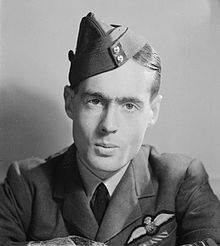Leonard Cheshire's Centenary
4 October 2017

On Thursday 7 September, the first full day of the Michaelmas Term, we celebrated the centenary of Leonard Cheshire’s birth (Chatham 36). His life serves as an exemplar to illustrate this year’s theme of character education: at the outbreak of the Second World War Cheshire volunteered for Bomber Command and was given command of an Armstrong Whitworth Whitley bomber. In 1940 he won the DSO for bringing his badly damaged and burning aircraft safely home after a raid on Cologne. A DFC medal followed and Cheshire reached the rank of Group Captain when he was only twenty-five years old. He was a remarkable leader: volunteering for every mission, even when it wasn’t his turn, treating air crew and ground staff, officers and other ranks, with equal respect. In 1943 he was given command of Guy Gibson’s legendary 617 squadron and refined the art of precision bombing by flying at a few hundred feet to mark the targets and minimise civilian casualties. When he received his citation for the VC, he had flown over 100 missions and was then chosen as the British observer of the bombing of Nagasaki on 15 August 1945. Having completed his courageous and distinguished military service, Cheshire dedicated his peacetime career to caring for others, starting at Le Court where he looked after Arthur Dykes, an ex-serviceman dying of cancer. Le Court soon filled with the disabled, the unwanted and the helpless and Cheshire’s philanthropic mission then spread to 50 countries and 270 homes. He never asked how disabled a person was, but what someone could achieve in spite of his or her disability. Cardinal Basil Hume gave the eulogy at Cheshire’s memorial service in 1992 and reflected that Cheshire had allowed God into his life and this transformed him. He had said yes to God, not half-heartedly, not with reluctance, but characteristically in a manner that was total and even radical. Recalling his time at Stowe, Cheshire wrote the following words: “I know only too well how great a debt I owe to Stowe, for the start that it gave me in life. Not only were they very happy days indeed, but I look upon myself as having been exceptionally fortunate in all my schooling. What a difference a good school can make, and how fortunate some of us are by comparison with others.” Leonard Cheshire is an Old Stoic who exemplifies the School’s moral, civic and personal values. One of the biggest challenges we face is to enable pupils to flourish as individuals and in society. We want Stoics to become the best versions of themselves, making the right choices in difficult situations, creating positive relationships, contributing to the common good and acquiring absolute values. Here are some of the virtues we want to embed into the culture and ethos of the School: Courage • Justice • Honesty • Compassion • Gratitude • Humility • Integrity • Respect • Service Aristotle said that the aim of our studies is not just to know what virtue is, but to become good. While schools should distil the wisdom of previous generations, equipping pupils with languages, scientific knowledge, numeracy and literacy, they should also teach character and virtue literacy so that pupils can act virtuously in a morally relativist world. Our pupils should have character, resilience, determination, adaptability, creativity and an unshakeable moral compass. We need more Stoics like Leonard Cheshire.
Dr Anthony Wallersteiner, Headmaster